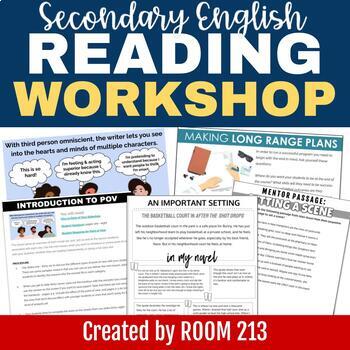Reading workshop bundle for middle or high school reader's workshop
- Zip
What educators are saying
Products in this Bundle (17)
showing 1-5 of 17 products
Bonus
Description
Everything you need to do independent reading or readers workshop in middle & high school: Reading workshop helps secondary students build reading stamina and a life-long love of reading. This bundle provides you with multiple resources to help you plan, organize, and assess a reader's workshop in your middle or high school classroom. You also get many mini-lessons and options for assignments.
If you want more mini-lessons & activities, check out the MEGA BUNDLE
See what other teachers are saying:
♥ Absolutely amazing bundle of resources!
♥ This is a fabulous resource! Everything you could ever consider in running a Readers Workshop is included. I did a Readers Workshop previously but had to create many of my own materials- This resource is an amazing time saver and is very clearly laid out! I'm so excited that I found this! THANK YOU!
The resource includes:
✅ Detailed instructions for how to use the handouts and activities
✅ Strategies and materials to help you plan and organize
✅ Lessons to teach students to be active, close readers
✅ Stations that teach students how to respond to a text
✅ Lessons that teach the elements of fiction
✅ Slideshows to guide the included mini-lessons
✅ Handouts for the students that focus on individual literary elements
✅ Graphic organizers to help students prepare for written reflections and small group discussions about the literary elements they have been tracking
✅ Writing prompts for independent reading
✅ Stations to help students focus on responses to their reading
✅ Assessments, conference guides, and scripts
Literary Elements Covered:
⭐️ Opening lines
⭐️ Setting & atmosphere
⭐️ Point of view & perspective
⭐️ Reliable and unreliable narrators
⭐️ Conflict
⭐️ Characterization
⭐️ Developing theme
___________________________________
Get tips, strategies, and freebies:
Learning in Room 213
Room 213 on Instagram
Be the first to know about my new discounts, freebies and products:
• Look for the green star near the top of any page within my store and click it to become a follower. You will then receive customized email updates about this store.
___________________________________
Copyright © ROOM 213
Permission to copy for single classroom use only.
Please purchase additional licenses if you intend to share this product.





